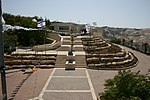Khan al-Ahmar (Arabic: الخان الأحمر, Hebrew: חאן אל-אחמאר, lit. The Red Caravansary) is a Palestinian village (sometimes referred to as the "Khan al-Ahmar school community") located in the Khan al-Ahmar area of the Jerusalem Governorate of the West Bank. In 2018, there were between 173 and 180 Bedouin, including 92 children, living there in tents and huts, upwards of 100 in 2010, with its local school serving the needs of 150 children in the area. Khan al-Ahmar is located between the Israeli settlements of Ma'ale Adumim and Kfar Adumim on the north side of Highway 1, between the junctions with Route 437 and Route 458.In May 2018, the Israeli High Court of Justice determined that its residents could be evicted. The United Nations, the International Criminal Court, the European Parliament and Amnesty International have stated that the demolition of the village would be a violation of international law, being a breach of the Fourth Geneva Convention, and may amount to a war crime. On 20 October 2018, the Israeli government announced that it would postpone the demolition. Subsequently, it was announced in 2019 that there would be no decision on demolition pending the election of a new government.
On 18 July 2021, the new government Foreign Minister Yair Lapid wrote that "Given that the new government was formed recently, and therefore has not yet been able to examine the issue in depth independently and not relying on the conclusions of the previous government, and considering that this is a particularly sensitive issue," he wanted to conduct an in-depth review and the court was asked for a delay until 14 September 2021. After 8 extensions up to 1 February 2023, the government asked once more for a further 4 month delay until 1 June 2023. The court granted an extension to 1 May for the hearing and to 1 April for the state to file its position.On 7 May 2023, Israel's Supreme Court denied the Regavim petition, accepting the government's argument that the eviction should be stayed "for current reasons related to the security of a country and its foreign relations" and that the government would itself decide when that would happen.











